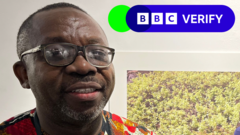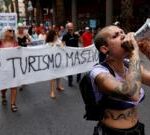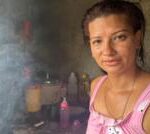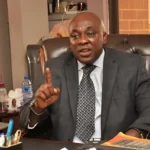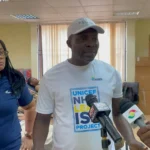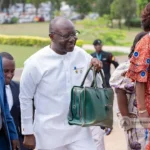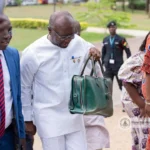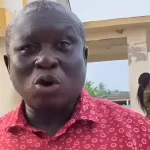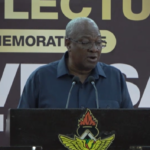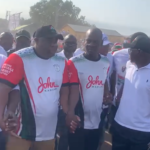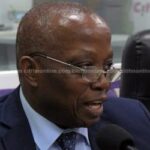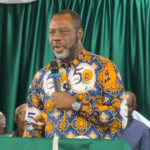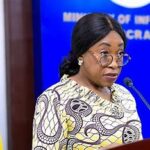Activist Leo Igwe is at the forefront of efforts to help people accused of witchcraft in Nigeria, as it can destroy their lives – and even lead to them being lynched.
“I could no longer take it. You know, just staying around and seeing people being killed randomly,” Dr Igwe tells the BBC.
After completing his doctorate in religious studies in 2017 he was restless. He had written extensively about witchcraft and was frustrated that academia did not allow him to challenge the practice head on.
The BBC has seen evidence of Pentecostal pastors in Nigeria holding services targeting alleged witches, a practice Dr Igwe says is not unusual in a country where many people believe in the supernatural.
Warning: This article contains details some readers may find disturbing.
So Dr Igwe set up Advocacy For Alleged Witches, an organisation focussed on “using compassion, reason, and science to save lives of those affected by superstition”.
Dr Igwe’s prevention work also extends to Ghana, Kenya, Malawi and Zimbabwe and beyond.
One of the people the organisation has helped in Nigeria is 33-year-old Jude. In August, it intervened when he was accused and beaten in Benue State.
Jude, a glazier, who also works part-time in a bank, says he was on his way to work one morning, when he met a boy carrying two heavy jars of water which prompted him to comment on the boy’s physical agility.
The boy did not take the comments kindly, but he went on his way.
Later, Jude was followed by a mob of about 15 people throwing stones at him. Among them was the boy he had greeted earlier.
“Young men started fighting me as well, trying to set me ablaze,” Jude says.
He was accused of causing the disappearance of the boy’s penis through witchcraft, an accusation that shocked him and is untrue.
Claims of manhood disappearances are not uncommon in some parts of West Africa.
It is a claim that has been linked to Koro syndrome, a mental illness otherwise known as missing or genital retraction hysteria.
It is a psychiatric disorder characterised by an intense and irrational fear of the genital organs going missing or retracting into the body of the victim.
Dr Igwe says Jude lost his job at the bank because of the stigma surrounding the accusation.
A video of the violent witch-hunting altercation also began to circulate on Facebook, which is when Dr Igwe and his team noticed and began to investigate.
“They brought him [Jude] out naked, you know, brutalised,” Dr Igwe says. “We first of all localise it – where is this taking place?”
On WhatsApp, Dr Igwe is something of an influencer.
Over the last few years he has built and curated WhatsApp groups for different Nigerian states.
These groups are full of dozens of concerned citizens who he dubs “advocates”. They share viral witch-accusation videos and photos and try to intervene when an allegation is being made on their patch.
“We reached out to him [Jude]. We sent him some money to take care of his wounds. We socially rehabilitate him,” Dr Igwe says.
Advocacy for Alleged Witches also wrote to the bank to try to prevent Jude from getting the sack, although they did not hear anything back, he says.
The group has also committed to paying Jude’s university fees, which it hopes can provide him with a fresh start.
Many in Africa’s most-populous country believe in, and live in fear of, witches and the diabolical powers they supposedly wield.
Financial problems, diseases or infertility are often blamed on witchcraft.
Those accused are often vulnerable. Most of the time they are either very young or very old, sometimes they have mental or physical disabilities and often they live in poverty.
According to Nigeria Watch, external, a website that monitors violence in the country via media reports, there have been eight deaths directly stemming from witchcraft accusations in 2024.
The BBC has not independently verified these figures, but has previously reported on assaults and murders of people accused of witchcraft in Nigeria and beyond.
“Belief in witchcraft or [the] supernatural in Nigeria is cultural,” says Dr Olaleye Kayode, a senior lecturer in African Indigenous Religions at the University of Ibadan.
“The belief is that witches are one of the supernatural beings created by God to stir the affairs of the Earth,” he adds, while stating that it is ignorance that makes people promote witch-hunting.
He blames witch-hunting in Nigeria primarily on preaching from “foreign religions” such as Christianity and Islam, but acknowledges traditional religions also “wage war” on witches.
Dr Igwe says that some of the country’s many influential Christian Pentecostal pastors reinforce superstitions about witchcraft, and the view that “any alleged witch is dangerous to the society, deserves no mercy and should be killed”.
While some of these church events are marketed as deliverance services, in August one of them was advertised with the theme “That Witch Must Die”.
The church behind the event trailed it extensively to its 20,000 followers on social media.
When Dr Igwe saw a billboard in Imo state advertising it, he wrote several petitions to the local authorities, as well as a number of articles for local media, trying to get it cancelled.
It went ahead anyway – Advocacy For Alleged Witches sent observers and continues to lobby against similar events.
The church responsible has not responded to the BBC’s request for comment.
No-one was killed at the Imo state event, but the “witch-must-die” rhetoric coming from churches can lead to hatred and violence, Dr Igwe says.
And many Nigerian churches are against such attitudes.
“Casting out demons and not killing those that are possessed of demons was what we know Jesus’ ministry for,” says Julius Osimen, a senior pastor at the Global Citizens Church in Lagos.
Mr Osimen describes any preaching encouraging witch-hunting as a misinterpretation of Bible verses.
“When Jesus came, he came with better understanding. You don’t kill people that are possessed or oppressed of demons, you simply cast the demons out,” he says.
Dr Igwe’s work has come with a personal cost. He says he has been beaten up three times for intervening on behalf of those accused of being witches and acknowledges his wife and children have expressed concerns for his safety.
But the activist says nothing will make him refrain or stop him from intervening: “My realisation is that I have to step forward and try to provide leadership.”
In Nigeria, it is an offence to accuse, or threaten to accuse, any person of being a witch or having the power of witchcraft.
It carries a maximum two-year prison sentence. However, prosecutions and convictions are rare.
In 2021 the UN Human Rights Council passed a resolution condemning human rights violations associated with witchcraft, yet such allegations continue to persist across much of Africa, as well as further afield including in India and Papua New Guinea.
“Trying to end witch-hunting is a challenge and we should not romanticise it in any way by trying to say: ‘Oh, it’s part of our culture,’” Dr Igwe says.
“It’s not part of our culture to kill our parents. It’s not part of our culture killing innocent people.”
Go to BBCAfrica.com, external for more news from the African continent.
Follow us on Twitter @BBCAfrica, external, on Facebook at BBC Africa, external or on Instagram at bbcafrica, external



